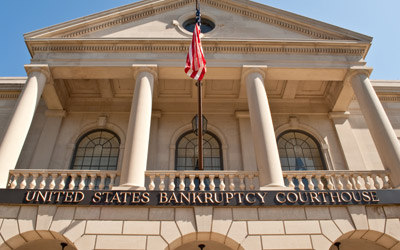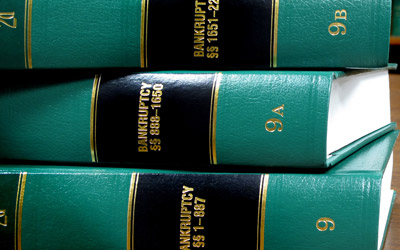Bankruptcy Articles
Bankruptcy Mistakes To Avoid
1. Waiting Too Long to File for Bankruptcy
It is human nature to put off very unpleasant events like filing for bankruptcy. Many of my clients feel that filing for bankruptcy is similar to admitting to being a failure in life. Let’s face it, no one wants to file bankruptcy. However, if you wait too long to file, then you give your creditors the opportunity to seize your assets by a garnishment and/or a bank levy. If you delay filing then your paycheck could be garnished, your bank account could be seized, or your car repossessed. A wage garnishment, a bank levy, a vehicle repossession, and a foreclosure can all be stopped by filing for bankruptcy.
The purpose of bankruptcy is to help you recover from a financial catastrophe. However, if you wait too long before you file then this can make your “comeback” much more difficult to achieve. Moreover, your bankruptcy lawyer will have to charge you additional legal fees to stop any wage garnishment, to stop a bank levy, or to contact the bank to release your repossessed car. If your mortgage company files for foreclosure then they will immediately add $3,500 to $5,000 to the amount that you will be required to pay to reinstate your mortgage. The mortgage company is entitled under New Jersey law to be reimbursed for legal fees, title costs, and for late interest. Therefore, if you delay filing for a bankruptcy then the amount that you will be required to pay to reinstate your mortgage will be much higher.
2. Obtaining a Second Mortgage Instead of Filing for Bankruptcy
Many clients try to put off filing for bankruptcy by obtaining a second mortgage or a home equity line of credit to pay off their unsecured debts or credit cards. However, this could be a disaster in the making. Essentially you are converting unsecured debt into secured mortgage debt. Consequently, in the future if you cannot make the payments on your first and second mortgage payments, then you can lose your home. Thereafter, the bank will file a foreclosure case against you. It is important to emphasize that the credit card companies can’t file for a foreclosure if they obtain a judgment against you. Therefore, it is not advisable to increase the amount of your mortgage debt and risk losing your home just to pay off your credit cards.
3. Wiping Out Your IRA and 401(K) Plans to Pay Off Your Creditors
In New Jersey, your IRA and 401(K) plan, as well as other tax qualified plans are considered to be exempt assets. Therefore, you can file for bankruptcy and you can still keep all of your retirement savings. It will be very important for a debtor to keep his retirement savings. If a debtor can retain his retirement savings then this will enable him to reestablish a normal life after the bankruptcy case is over. Moreover, it will be much easier for a debtor to reestablish his credit if he can retain his retirement savings. Many lenders will be more inclined to extend credit to a debtor if he has a reasonable amount of funds in his retirement account. It is not advisable to sacrifice your retirement savings security just to pay off your credit cards. Eventually, you may still have no other option but to file for bankruptcy. However, if you are still forced to file then your life will be much easier if you can retain your retirement savings.
4. Filing When You Have a Substantial Tax Refund Pending
The exemption for tax refunds is limited, and an ill‑timed bankruptcy may jeopardize your refund. Therefore, you should discuss any anticipated tax refunds with your attorney before you file for bankruptcy.
5. Reaffirming Burdensome Debt
If you reaffirm and keep your loans through the bankruptcy then this will make it much more difficult or impossible for you to recover after your bankruptcy. It is not advisable to retain any credit cards that have significant balances. I have handled more than one thousand bankruptcies in my career. Most of my clients advise me that after they have filed, many banks and credit card companies still have sent them new credit cards after their case was completed. Therefore, there is virtually no benefit in reaffirming old credit card debt.
6. The Failure to List All Creditors
I always advise all of my clients that the most important part of their case is to ensure that your bankruptcy petition is prepared adequately. Moreover, I always advise my clients that I am not a mind reader and I don’t know to whom they owe money to. It is critically important for a debtor to list all of his debts in the bankruptcy petition. If you forget to list a creditor on your bankruptcy petition then this debt may not be discharged. You should list all creditors, even if you intend to repay the creditor. Moreover, you must also include debts owed to family members and other insiders.
If you forget to list all of your creditors, and if the debt reappears after the case is closed, then you will be forced to file a motion to reopen up your case. The filing fees are substantial to file a motion to reopen up your bankruptcy case. Moreover, the legal fees to accomplish this are also substantial. In fact, in many cases there is more work involved to reopen up a bankruptcy case than was required to file it. Therefore, it is very important to ensure that all of your debts and creditors are completely listed on your bankruptcy case. The paperwork is the most important part of the bankruptcy process. If your paperwork is incomplete and careless, then you will not achieve the debt relief that you want to.
7. Running Up Significant Credit Card Debt Shortly Before You File for Bankruptcy
You must tell your attorney if you have taken significant cash advances, incurred balance transfers, or made other large purchases within the previous three (3) months before you file. At the meeting of the creditors most of the Bankruptcy Trustees ask a debtor if he has used any credit card within the past 90 days. I always insist that there is at least ninety (90) day freeze on credit card usage before I file any case. The bankruptcy courts do not like it when a debtor “games the system.” The whole purpose of the bankruptcy system is grant debt relief to “honest” debtors. If the Bankruptcy Trustee believes that you are being manipulative then you could be forced to file a chapter 13, or you could be denied a discharge.
8. Paying Back Loans to Family Members Before You File for Bankruptcy
A debtor should not repay any loans to family members (or insiders) within one year of filing bankruptcy should be avoided. The Trustee can sue your family members to recover sums paid to them within the past year.
9. Transferring Non‑Exempt Assets to Others
Any assets that are transferred in the anticipation of filing a bankruptcy may be recovered by the Bankruptcy Trustee as a fraudulent conveyance. Thus, if you give away money or other assets to your children, parents, or siblings this action will not protect these assets from the Bankruptcy Trustee. Moreover, the Bankruptcy Trustee may consider these actions to constitute an act of bad faith, and as an abuse of the bankruptcy system. Moreover, the Bankruptcy Trustee may refer your case to the United States Trustee as an abuse and neglect case, and you may be denied a discharge. Therefore, your bankruptcy could be denied, and your credit will still be ruined because you have filed for bankruptcy.
10. Ignoring Letters From the Court and Your Attorney
Any notice or letter that you receive from either the Bankruptcy Court or your attorney is very important. The failure to respond to a correspondence may have adverse consequences on your case. There are very good reasons why your attorney is trying to contact you or he is asking you for information and documents. It is important for you to cooperate with your attorney as much as possible.






